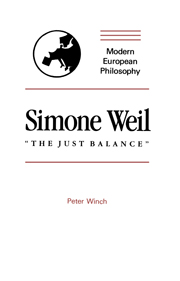Book contents
- Frontmatter
- Contents
- Acknowledgements
- 1 Introduction
- 2 The Cartesian background
- 3 The sensations of the present moment
- 4 “La simple perception de la nature est une sorte de danse”
- 5 Language
- 6 Necessity
- 7 Equilibrium
- 8 “Completely free action”
- 9 The power to refuse
- 10 “The void”
- 11 Geometry
- 12 Incommensurability
- 13 Beauty
- 14 Justice
- 15 “A supernatural virtue”?
- Notes
- Bibliography
- Index
15 - “A supernatural virtue”?
Published online by Cambridge University Press: 05 February 2010
- Frontmatter
- Contents
- Acknowledgements
- 1 Introduction
- 2 The Cartesian background
- 3 The sensations of the present moment
- 4 “La simple perception de la nature est une sorte de danse”
- 5 Language
- 6 Necessity
- 7 Equilibrium
- 8 “Completely free action”
- 9 The power to refuse
- 10 “The void”
- 11 Geometry
- 12 Incommensurability
- 13 Beauty
- 14 Justice
- 15 “A supernatural virtue”?
- Notes
- Bibliography
- Index
Summary
What sort of concept is that of the supernatural? We are not of course here in the territory occupied by ghosts, poltergeists, hauntings, spiritualism, and other paranormal phenomena, whatever that territory may be and whatever may be its more or less distant connections with the territory we are in. The phenomena to which Simone Weil does draw attention are not paranormal and the Society for Psychical Research would have no interest in them.
Are we then in the region of metaphysics? Does Simone Weil have a theory about the nature of the universe, as divided into two realms, the natural and the supernatural? I think the answer must be a qualified no. But the question is not an easy one and I want to spend more time exploring it.
Let us consider what she says about creation, which is certainly a subject which is often discussed and theorized about by metaphysicians. It cannot be denied that to think about creation is to think about the origin of the world, of the universe. What could be more metaphysical than that?
Well, we find many extremely different kinds of interest expressed in this way: as an interest in the origins of the universe. There is for instance the narrative of the Book of Genesis. There is also the sort of thing one hears from astrophysicists and cosmologists debating the rival merits of “the big bang” and “continuous creation,” where the same word (“creation”) is used as in Genesis. People are often led to wonder which, if any, of these accounts is “right.”
- Type
- Chapter
- Information
- Simone Weil: "The Just Balance" , pp. 191 - 211Publisher: Cambridge University PressPrint publication year: 1989



